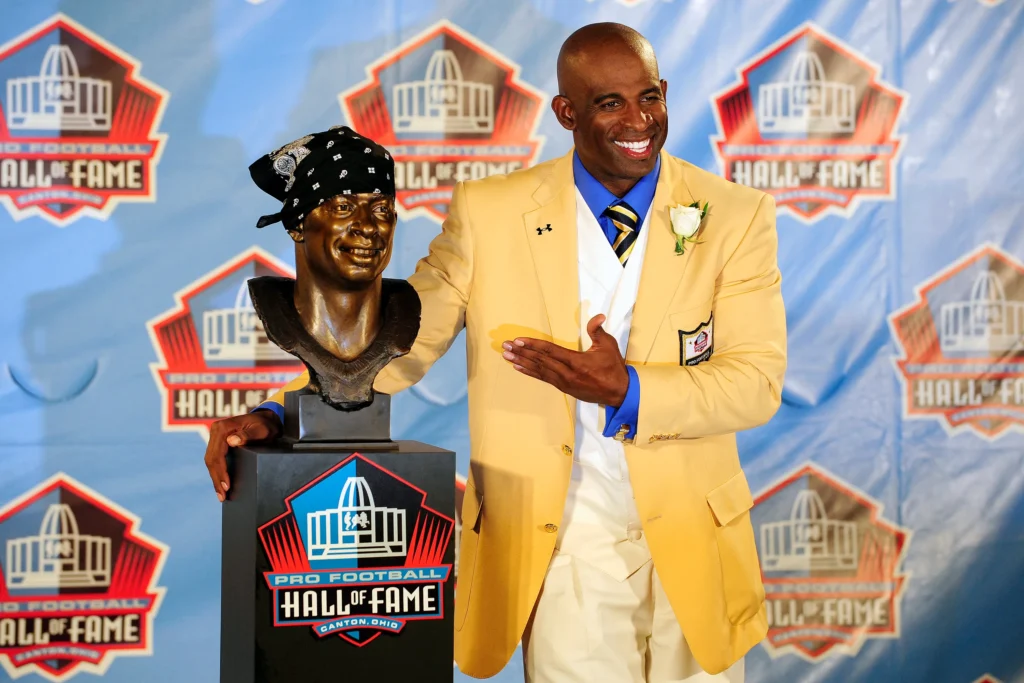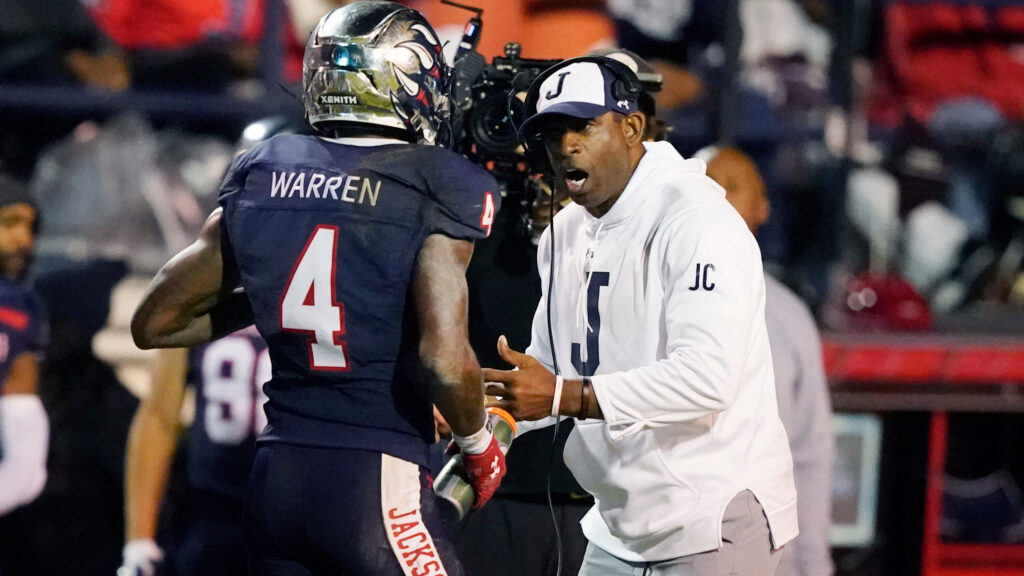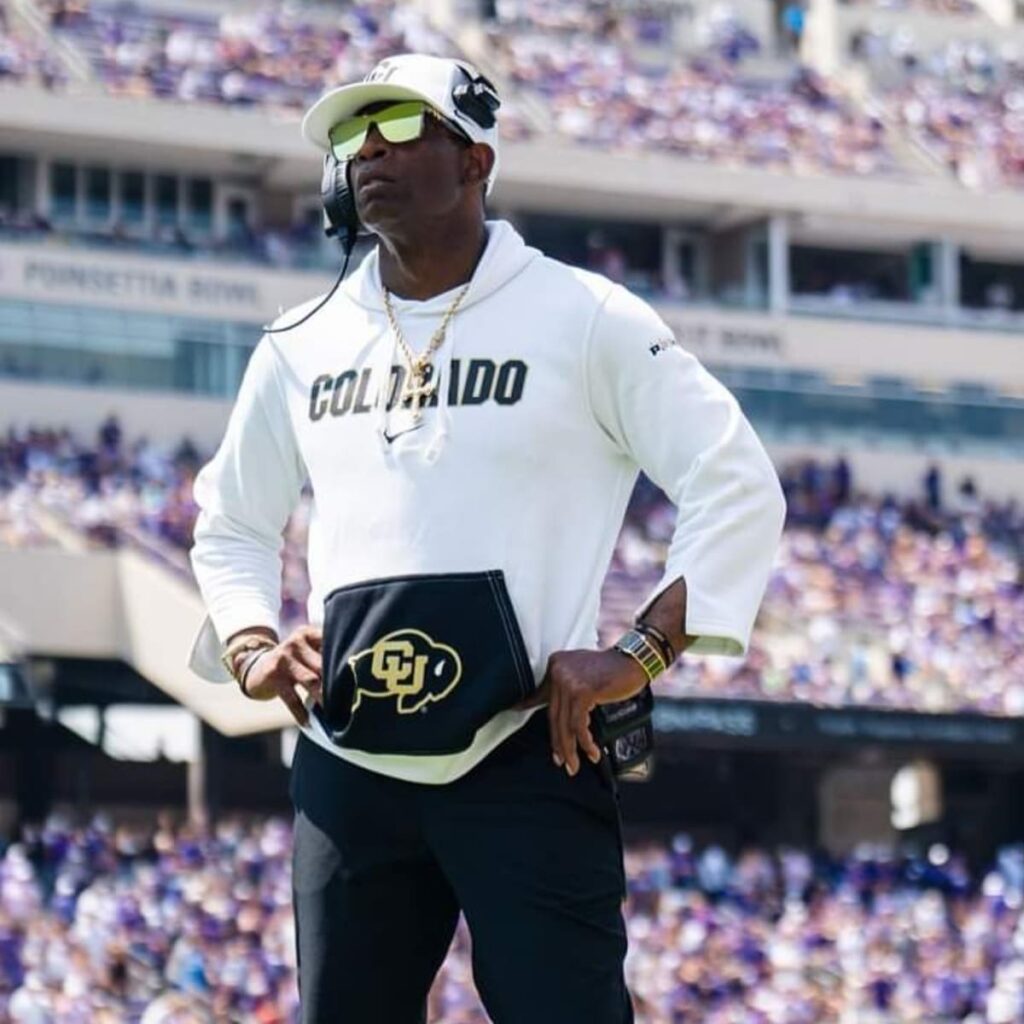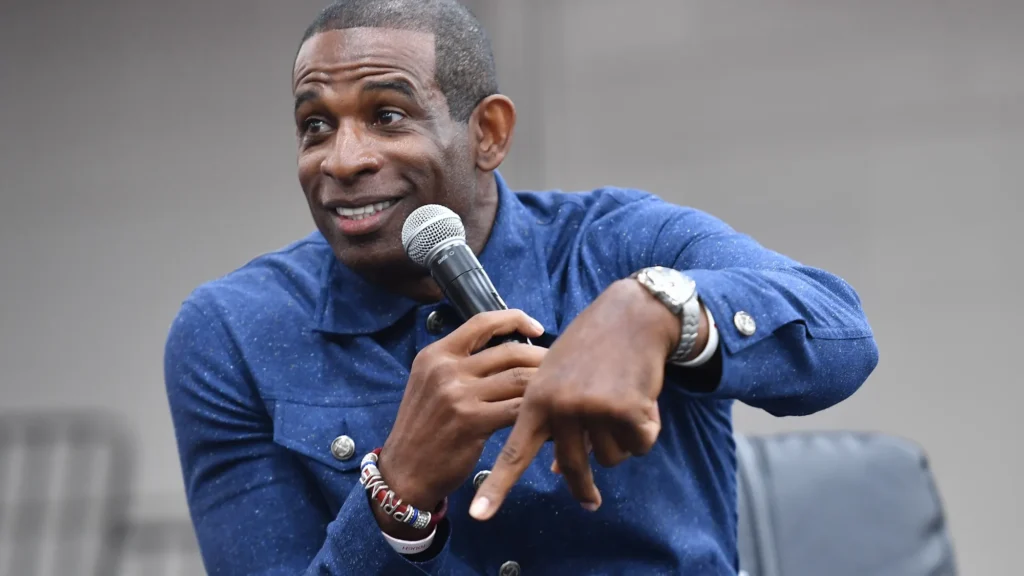“The Most Renowned College Football Coach in History: Deion Sanders”
Introduction
Deion Sanders, a name synonymous with excellence in football, has made an indelible mark on the sport. While he is widely celebrated for his illustrious career as an NFL player, it is his transition to college football coaching that has recently thrust him into the spotlight. In this in-depth exploration, we delve into the extraordinary journey of Deion Sanders as a college football coach, highlighting his achievements, influence, and the unique qualities that set him apart.

The Unconventional Path to Coaching
Before delving into Deion Sanders’ coaching career, it is imperative to acknowledge the unorthodox path that led him to this role. Unlike most college football coaches who have extensive coaching backgrounds or careers, Sanders brought a unique perspective to the table. His journey from a legendary NFL cornerback to a college football coach is one filled with twists, turns, and immense determination.
Sanders began his football career at Florida State University, where he was a standout player known for his exceptional speed, agility, and flair. He then enjoyed a successful NFL career, playing for teams like the Atlanta Falcons, San Francisco 49ers, Dallas Cowboys, Washington Football Team, and the Baltimore Ravens. His accolades as a player are staggering, boasting two Super Bowl rings, eight Pro Bowl selections, and inclusion in the Pro Football Hall of Fame. These achievements alone would have sufficed to secure his legacy in the annals of football history.
However, Sanders’ passion for the game extended beyond his playing days. His charismatic personality and deep knowledge of the sport made him a sought-after commentator and analyst on various television networks, further cementing his presence in the football world. Little did anyone know that his next venture would take him back to the roots of the sport – college football.

Prime Time’s Arrival at Jackson State
In September 2020, Deion Sanders made a significant announcement that sent shockwaves through the college football community. He was appointed as the head football coach at Jackson State University, a historically Black college (HBCU) located in Jackson, Mississippi. This decision marked a pivotal moment in the history of college football and HBCUs, bringing unprecedented attention to both.
Sanders’ arrival at Jackson State was more than just a coaching hire; it was a cultural phenomenon. The university, which had long been overlooked by top recruits and the media, suddenly found itself in the national spotlight. Sanders’ charisma and star power drew attention from aspiring athletes who saw an opportunity to learn from one of the greatest to ever play the game.
The Impact on Recruitment
One of the immediate effects of Deion Sanders’ appointment was the influx of top-tier talent to Jackson State. High-profile recruits who had previously never considered HBCUs as viable options began to take notice. Sanders’ reputation as a football legend and his ability to connect with young athletes gave Jackson State a unique recruiting advantage.
Highly touted prospects, including some who had committed to Power Five schools, reevaluated their choices and decided to join the Jackson State Tigers. Sanders’ pitch was simple but compelling: he offered a chance to be part of a program on the rise, to learn from an NFL Hall of Famer, and to play a pivotal role in rewriting the narrative of HBCU football.
The 2021 recruiting class, dubbed the “Dream 21,” was a testament to Sanders’ ability to attract talent. This group of young athletes brought newfound excitement and expectations to Jackson State, and their presence symbolized a turning point in college football recruitment dynamics.

A New Era of HBCU Football
Deion Sanders’ presence at Jackson State not only transformed the program but also ignited a broader conversation about the role of HBCUs in college football. Historically, these institutions have faced challenges in recruiting top talent due to the lure of Power Five programs and the perception of limited exposure.
However, Sanders’ success in bringing high-profile recruits to Jackson State demonstrated that HBCUs could compete at the highest level. It raised questions about whether more star athletes would consider HBCUs and whether these schools could become powerhouses in college football.
The Impact on Historically Black Colleges and Universities
The effects of Sanders’ coaching tenure extended beyond Jackson State. His success and visibility highlighted the rich history and potential of HBCUs in collegiate athletics. It inspired conversations about increased investment in these institutions, both in terms of athletic facilities and academic programs.
Major corporations and donors began to take notice, recognizing the value of supporting HBCUs. This newfound interest translated into increased funding for scholarships, improved facilities, and expanded academic opportunities at HBCUs across the nation. The “Deion Effect” had a ripple effect that reached far beyond the football field.

Coaching Philosophy and Leadership
To understand the success of Deion Sanders as a college football coach, it is essential to examine his coaching philosophy and leadership style. Sanders brought a wealth of football knowledge from his playing days, but his approach went beyond the Xs and Os.
- Player Development: Sanders emphasized the holistic development of his players. He viewed himself as not just a football coach but also a mentor, guiding young athletes through the challenges of college life. His commitment to nurturing their growth as individuals was evident in his hands-on approach to mentoring.
- Football IQ: Given his extensive experience in the NFL, Sanders placed a strong emphasis on football IQ. He challenged his players to understand the game on a deeper level, encouraging them to think strategically and make intelligent decisions on the field.
- Discipline and Accountability: Sanders instilled a sense of discipline and accountability in his players. He set high standards for behavior and performance, and players who did not meet these standards were held accountable. This approach contributed to a culture of responsibility within the team.
- Passion and Energy: Sanders’ passion for football was contagious. His energy on the sidelines and in practice motivated his players to give their all. He often spoke about the importance of loving the game and playing with heart.
- Community Engagement: Sanders believed in the importance of giving back to the community. He encouraged his players to be active in community service and to use their platform as athletes to make a positive impact.

Challenges and Criticisms
Despite his remarkable success, Deion Sanders faced his share of challenges and criticisms as a college football coach. Some questioned his lack of coaching experience at the collegiate level, arguing that his success was due in large part to his star power and NFL background. Others raised concerns about the high expectations and pressure placed on his young players.
Additionally, Sanders’ outspoken and unfiltered personality sometimes drew negative attention. He was not afraid to express his opinions, even if they were controversial, which led to occasional clashes with the media and opposing coaches.
Moreover, the rapid success of Jackson State under Sanders’ leadership raised questions about the sustainability of the program’s performance. Some wondered whether the Dream 21 recruits would stay for the long term or eventually transfer to larger, more established programs.

Conclusion
In the realm of college football coaching, Deion Sanders is a unique and transformative figure. His unconventional path to coaching, coupled with his immense success, has reshaped the landscape of HBCU football and inspired a new generation of athletes.
Sanders’ impact extends far beyond the football field. His emphasis on player development, discipline, and community engagement has left a lasting impression on the young men he coached. Moreover, his success has drawn attention to the potential of HBCUs and sparked increased investment in these historically significant institutions.
While Sanders’ journey as a college football coach is still in its early stages, his influence is already undeniable. Whether you view him as a maverick, a trailblazer, or simply “Prime Time,” there is no denying that Deion Sanders has left an indelible mark on the world of college football. As his coaching career continues to unfold, the football world will be watching closely to see what he accomplishes next.


